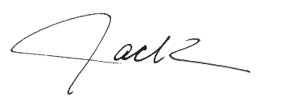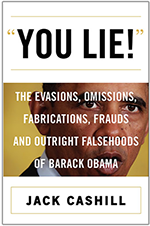Letter to a Young Entrepreneur
![]()
© Jack Cashill
Published in Ingramsonline.com - September 2014
A few months back, while driving down I-70 on the ultimate perfect spring afternoon, I glanced off to my left and saw Kauffman Stadium filling with people. As I exited to turn back to the ballpark, I was reminded anew of one of life’s great lessons: at a certain point in your career, you should not have to ask a boss’s permission to do—or not do—anything.
As I begin my 25th year of at least semi-successful self-employment, I thought I might share with you some ideas on how to unshackle yourself from wage slavery. In the spirit of famed parapsychologist Dr. Peter Venkman, I present these not as rules—rules are for the old you—but as guidelines.
Get married.
It would be nice if your spouse were kind, loving, bright, and attractive, but none of that is essential. What is essential is that your spouse have a steady job and benefits. When you hit a bad streak as an entrepreneur—and you will—you don’t want to have take your kid’s tonsils out by watching a how-to video on YouTube.
If you’re still single, you might rethink where you go to find a mate. I’d recommend the cafeteria of the Downtown federal building, the faculty lounge of the neighborhood middle school, or, if push comes to shove, the loading dock of your local Post Office. It is O to limit your pool of eligibles to “height/weight proportionate,” but don’t be too fussy.
Know thyself.
I had been working at an ad agency when I started plotting my escape from serfdom. There, I was the creative head, the Don Draper of my own retrospective imagination. What I realized, though, it was that the real money accrued to the Pete Campbells, the account people, squirrely though they might be.
In setting up my own shop, I had to be Pete, but I still wanted to be Don. I wearied quickly of wearing suits to work, bossing my uninspired slugs around, and “networking.”
I did not even like the word “networking.” Still don’t.
Although Pete was doing well enough and had much more upside potential than Don, I knew I had to kill Pete. That I did. It took a few years, but it was worth it. Still, having tasted freedom, there was no going back. I would have to go solo.
Don’t undersell yourself.
Good clients will not respect you if you undersell your services.
So from the beginning, I decided to promote my offerings as a “premium communications service.” That meant charging the shockingly high, premium price of $100 AN HOUR. As you read this, you may be thinking of the scene in Austin Powers when Dr. Evil, having been wakened from the past, says to his sidekick, “Here’s the plan. We get the warhead and we hold the world ransom for… ONE MILLION DOLLARS!” I’m thinking the same thing.
Find a charter client.
For me, that has been Ingram’s. For more than 20 years now, I know that each month I will have at least some work, as little or as much as the publishers need. This is at least as important psychologically as it is financially. That much said, if you overly depend on a given client—Lucky Strike comes to mind—you’re their beeyitch.
Don’t look needy.
It’s not the client’s job to make sure you make your monthly mortgage payment. That’s the job of your letter-carrier spouse. So don’t harass your clients to pay within 30 days or 60 or even 90 days. Your cash flow is your problem, not theirs.
Don’t turn down work.
As an entrepreneur, you will lead a bi-polar existence: either too much work or too little. Although each creates its own kind of stress, trust me, the latter creates much more than the former. When your client asks if
you can synthesize new chemical elements by nuclear transmutation, you say, “Sure.” You can always find out how on the Internet, and, if not, you can find a subcontractor who can.
Define your services broadly.
When I started, I used the words “communications” in the company title rather than “advertising” or “marketing.” I wanted to make a credible case that I could communicate just about anything anyone had to communicate.
About 20 years ago, I hooked up with a recently retired Army major who planned to create a Web presence for banks. I signed on as Web page designer—whatever that was—and we pitched a few banks together. “The World Wide Web?” said one banker after another. “What’s that? Why would we need a Web presence?” My partner went out of business, and I went back to communicating other stuff.
Go with the flow.
The Internet did eventually change my business model. I suddenly found myself with more information-gathering capacity at my fingertips than the entire New York Times newsroom had 20 years ago. So, in mid-life, lo and behold, I became an investigative reporter. Who’da thunk it?
In fact, though, I represented a new model of reporter, one who wasn’t above creating an ad or two when opportunity called. The ability to change direction, my young friend, is an entrepreneurial imperative. The ability to mix and match is the charm. I don’t think the folks at The Times get to do ads on the side.
Meet your deadlines.
In the last decade or so, I have landed nine book contracts with reputable publishers, Simon & Schuster and HarperCollins among them. People ask me, “Hey, Jack, you’re not exactly J.K. Rowling. How do you keep getting new deals?”
“It is simpler than it seems,” I answer. “You meet your deadlines.” That I learned in advertising. It also helps to treat your publisher the way you would a client, meaning stifle your inner yahoo at least until your first Harry Potter.
Stay married.
As a final word of advice, my friend, stay married. Trust me on this; I know. Spouses with lifetime gigs may gripe endlessly about their jobs, but remember, at the end of the day, they’re the ones with the pensions.




